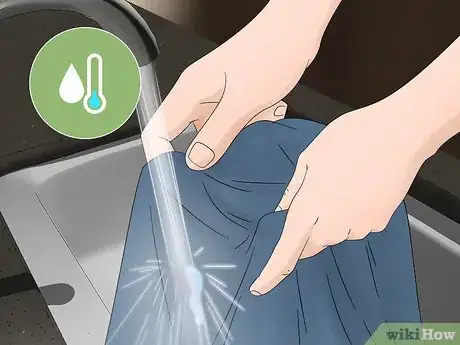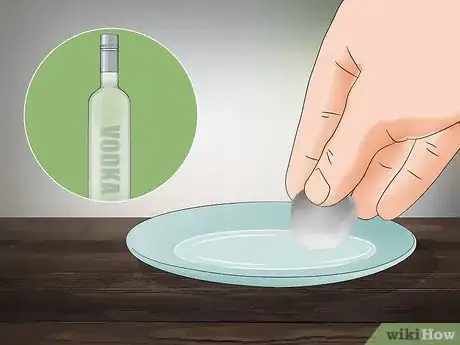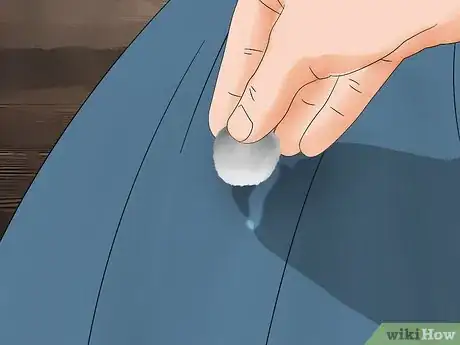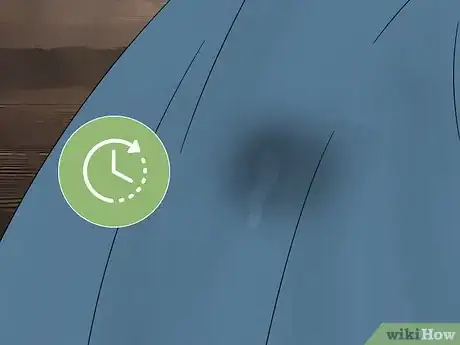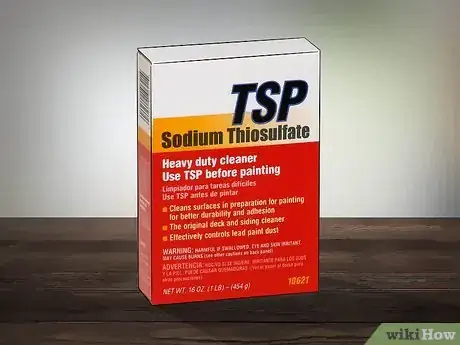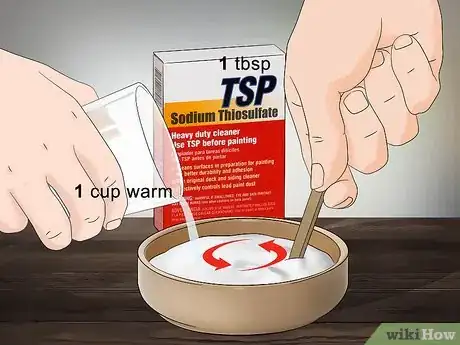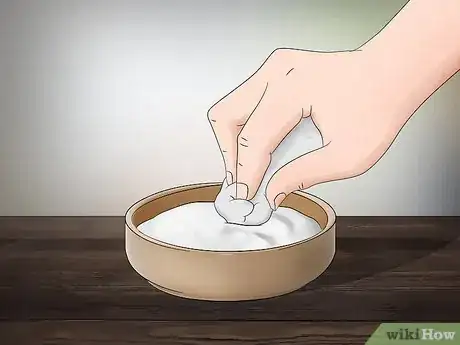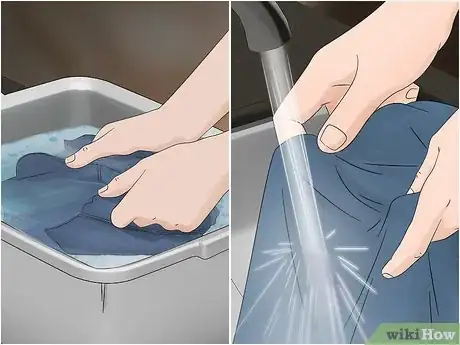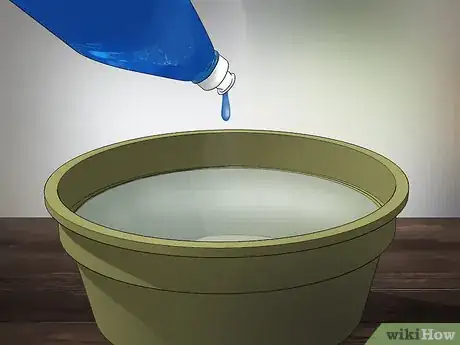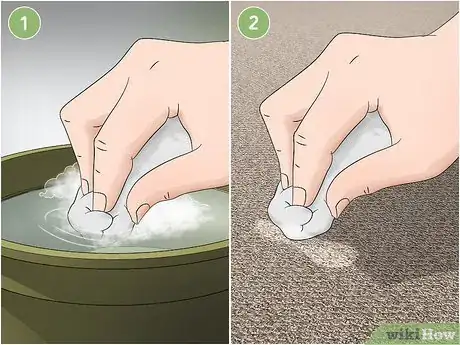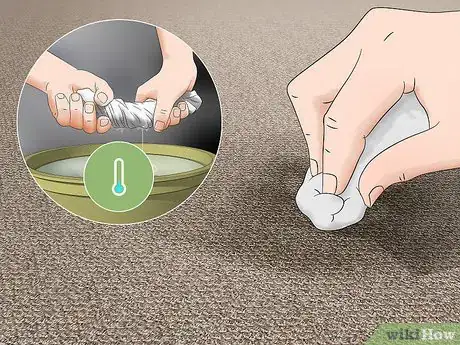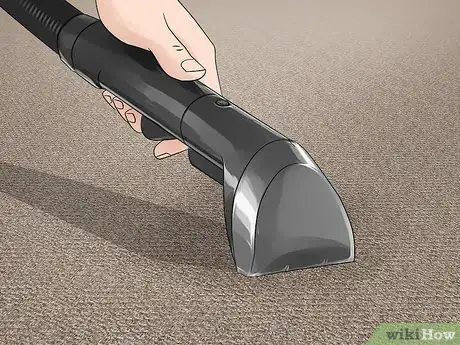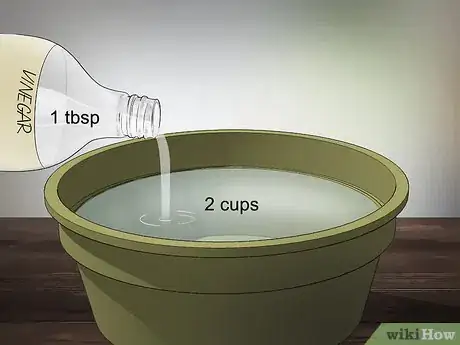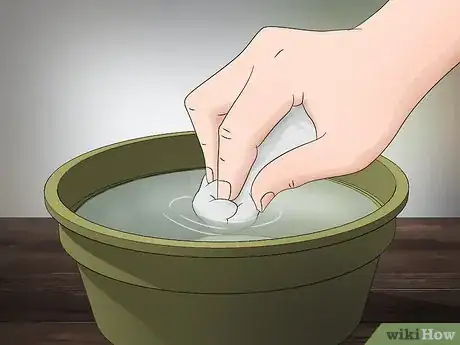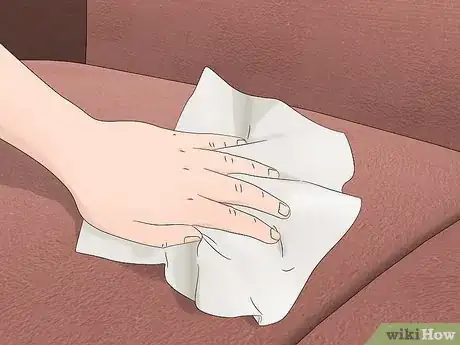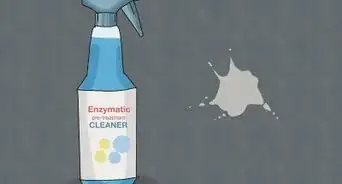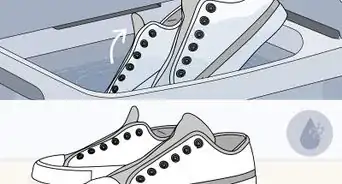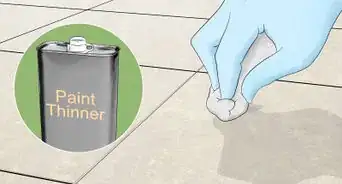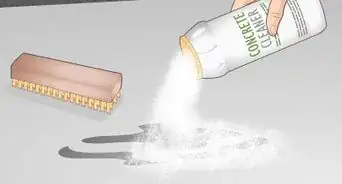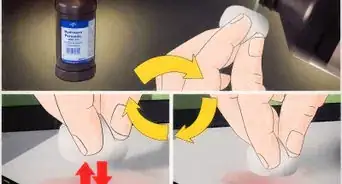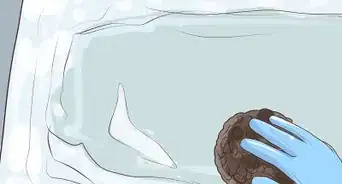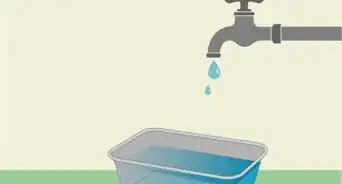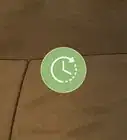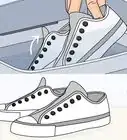This article was co-authored by wikiHow Staff. Our trained team of editors and researchers validate articles for accuracy and comprehensiveness. wikiHow's Content Management Team carefully monitors the work from our editorial staff to ensure that each article is backed by trusted research and meets our high quality standards.
There are 7 references cited in this article, which can be found at the bottom of the page.
This article has been viewed 255,325 times.
Learn more...
Bleach can easily stain fabric, upholstery, and even carpet if you are not careful. Unfortunately, it is a common household product that is hard to avoid using. Once the bleach strips the color on something, you might feel that the colorless stain is permanent. But if you act fast with clear alcohol to treat small spots or dark fabric; a diluted solution of sodium thiosulfate to treat large spots on fabric; and liquid dishwasher detergent or white vinegar to treat fabric, upholstery, and carpet, you may just be able to reverse or fade the bleach stain before it sets.
Steps
Fixing Spots with Clear Alcohol
-
1Rinse the fabric under cold water to remove the bleach. In order to avoid mixing the bleach with the clear alcohol, thoroughly rinse the item with cold water until the smell of bleach dissipates. Since the clear alcohol seeps into the fabric dye and spreads it, any bleach left in the fabric might spread with the dye.[1]
-
2Soak a cotton ball in clear alcohol like gin or vodka. Clear alcohol works best on small bleach spots or on dark fabrics. This is because the alcohol dilutes the dye in the fabrics and redistributes it to the whitened area.[2]
- Clear alcohol is not an effective treatment for large bleach stains or for lighter fabrics as there is not enough dye for the clear alcohol to redistribute. Try an alternative method to treat the stain if this applies to you.[3]
Advertisement -
3Rub the soaked cotton ball over the stain and surrounding fabric. The original dye in the fabric will begin to redistribute over the stained area. Continue to rub the area until the stain is covered up to your satisfaction.[4]
-
4Let the fabric air dry, and then wash it to remove excess alcohol. You want to give the dyes in the fabric a chance to settle before you wash away the clear alcohol. As soon as the fabric is dry, wash it as you normally would to avoid any additional discoloring that can occur from the residue of the clear alcohol.[5]
Treating Fabric with Diluted Sodium Thiosulfate
-
1Purchase some sodium thiosulfate at your local department store. Sodium thiosulfate, also known as photograph fixer, can be used to neutralize the effects of bleach stains on fabric. It can be purchased at local department and pet stores, or it can be purchased through big-box stores and online retailers.[6]
- Find products that are advertised as chlorine neutralizers. Those will contain the sodium thiosulfate needed to treat the bleach stain on the fabric.[7]
- This works well as an immediate treatment. If the stain has been sitting for a while, the diluted solution might not remove the stain entirely, but instead make it considerably less noticeable.[8]
-
2Mix 1 tbsp (14.3 g) of sodium thiosulfate with 1 cup (240 mL) of warm water. Mix the solution in a bowl or a plastic basin you solely use for cleaning purposes. Make sure to stir this diluted solution with a disposable spoon until all of the sodium thiosulfate is dissolved.[9]
-
3Take a clean white cloth and dip it in the diluted sodium thiosulfate. You don’t have to use a white cloth to do this, any old cloth with work fine. Just know that a cloth that is not white will retain stains from the bleach you are lifting from the fabric.[10]
- Use cotton balls if you do not have a clean cloth.
-
4Blot the stain with the damp cloth until the fabric absorbs the liquid. Make sure to blot the fabric and not rub it. If you rub the fabric with the diluted solution you could potentially damage the fabric.[11]
- Rinse the fabric in cold water if the stain is still visible. Then treat it again with the diluted sodium thiosulfate. Continue to treat the fabric until the stain is reduce to your liking.
-
5Wash and dry the fabric as you normally would. Even if you have rinsed the fabric in cold water, you need to make sure that all of the diluted sodium thiosulfate is gone. Separately wash the fabric so the item is clean and ready for you to wear.[12]
Diluting Liquid Dishwasher Detergent
-
1Mix liquid dishwasher detergent with water to treat the bleach stains. Diluted dishwasher detergent can help neutralize bleach stains on fabric, upholstery, and carpet. Different materials will require different water temperatures in order to be effective.[13]
- For fabric and upholstery, mix 1 tablespoon (15 mL) of liquid dishwasher detergent with 2 cups (470 mL) of cool water.[14]
- For carpet, mix 1 tablespoon (15 mL) of liquid dishwasher detergent with 2 cups (470 mL) of warm water.[15] Warm water is typically preferred over cold water to treat or clean carpets as it is more effective in lifting dirt and liquid residues from the carpet fibers. Most professional carpet cleaners only use warm water to clean carpets.[16]
-
2Dip a clean, white cloth into the solution, and blot at the bleach stain. Work from the outside of the stain towards the center. You will have a better chance of reversing the less saturated areas away from the central point, so focus on the edges first.[17]
- If you do not have a white cloth, use a colored cloth or cotton balls instead. Since you are lifting the bleach stain, it may stain whatever cloth you choose to use.[18]
-
3Let the solution soak for 5 minutes. You want to give the dishwasher detergent solution a chance to lift up the bleach stain. Just make sure the area is saturated with the solution before letting it soak.[19]
-
4Use a clean cloth to blot the treated area with cold water. This will help remove any of the bleach residue that was lifted by the diluted dishwasher detergent. Continue to blot the area until it is dry, or until no more of the bleach is lifting from the treated area.[20]
- Blot at the stain with more solution and rinse it with more clean water until the stain is less noticeable, or until you are satisfied with the results.[21]
-
5Vacuum the treated carpet once it is dry to restore the natural texture. The treated area of the carpet might be stiff or a bit matted once you are done cleaning it. Leave the carpet to dry overnight, and then run a vacuum over the carpet in the morning. To speed up the drying process, press paper towels into the carpet to absorb any excess liquid.[22]
Using Diluted White Vinegar
-
1Mix white vinegar with water to treat a bleach stain. Using white vinegar is a great natural way to treat a bleach stain. You can either treat a bleach stain only with white vinegar, or you can use the white vinegar as a follow up to treating the stain with a diluted dishwasher detergent solution. Just know that different materials require different water temperatures to be effective.[23]
- For fabric and upholstery, mix 1 tablespoon (15 mL) of white vinegar with 2 cups (470 mL) of cold water.[24]
- For carpet, mix 1 tablespoon (15 mL) of white vinegar with 2 cups (470 mL) of warm water.[25] Warm water will pull up more of the bleach stain from the carpet fibers, along with any of the dirt and grime the bleach might have adhered to. This is why warm water is typically used to steam clean carpets.[26]
-
2Soak a clean, white cloth in cold water to blot the stained area. You want to pretreat the area with water to remove as much of the bleach as possible. Mixing vinegar and bleach can produce a toxin called chlorine gas. Keep blotting the area until the smell of the bleach has dissipated.[27]
- If you already treated the area with the diluted dishwasher detergent solution, make sure that the area is clean before applying the white vinegar.
-
3Use the cloth to blot the stain with the diluted vinegar. The vinegar solution will lift the bleach residue, and reduce the visibility of the stain. Continue to blot at the stain until the area has become dampened with the vinegar solution.[28]
- Just be careful not to completely saturate the item with the white vinegar. Any buildup of white vinegar can start to damage or disintegrate some materials.[29]
-
4Take a clean cloth and blot the treated area with cold water. The water will remove the lifted bleach residue along with the vinegar solution. Continue to blot the area until no more bleach is lifting from the treated area, or until the smell of the vinegar solution has dissipated.[30]
- Treat the area with more of the solution if you are not satisfied with the results. Just make sure to blot the area with a clean, damp cloth so you don’t leave behind any of the diluted vinegar.
Community Q&A
-
QuestionHow do you get yellow bleach stains out of white clothes?
 wikiHow Staff EditorThis answer was written by one of our trained team of researchers who validated it for accuracy and comprehensiveness.
wikiHow Staff EditorThis answer was written by one of our trained team of researchers who validated it for accuracy and comprehensiveness.
Staff Answer wikiHow Staff EditorStaff AnswerWhite vinegar can sometimes get rid of stubborn yellow bleach spots. Rinse the fabric thoroughly to make sure all the bleach is gone, then put a few drops of vinegar on the stain and let it sit for a few minutes. Rinse the fabric with cool water to wash out the vinegar. If that doesn’t work, try taking the garment to a professional cleaner. They may have a product that will work.
wikiHow Staff EditorStaff AnswerWhite vinegar can sometimes get rid of stubborn yellow bleach spots. Rinse the fabric thoroughly to make sure all the bleach is gone, then put a few drops of vinegar on the stain and let it sit for a few minutes. Rinse the fabric with cool water to wash out the vinegar. If that doesn’t work, try taking the garment to a professional cleaner. They may have a product that will work. -
QuestionCan you dye a bleach stain?
 wikiHow Staff EditorThis answer was written by one of our trained team of researchers who validated it for accuracy and comprehensiveness.
wikiHow Staff EditorThis answer was written by one of our trained team of researchers who validated it for accuracy and comprehensiveness.
Staff Answer wikiHow Staff EditorStaff AnswerYes, you can cover bleach stains with dye. In order to ensure that your garment is the same color all over, it might be best to first bleach the whole garment with a fabric color remover (such as Rit Color Remover), then dye the entire garment according to the directions on your preferred dye. You can also try coloring in the stain with a fabric marker that matches the color of the rest of the clothing.
wikiHow Staff EditorStaff AnswerYes, you can cover bleach stains with dye. In order to ensure that your garment is the same color all over, it might be best to first bleach the whole garment with a fabric color remover (such as Rit Color Remover), then dye the entire garment according to the directions on your preferred dye. You can also try coloring in the stain with a fabric marker that matches the color of the rest of the clothing. -
QuestionHow do you get rid of bleach stains on dark clothes?
 wikiHow Staff EditorThis answer was written by one of our trained team of researchers who validated it for accuracy and comprehensiveness.
wikiHow Staff EditorThis answer was written by one of our trained team of researchers who validated it for accuracy and comprehensiveness.
Staff Answer wikiHow Staff EditorStaff AnswerShort of re-dying the garment, using alcohol is probably your best bet. The alcohol will cause the dyes around the stain to break down, allowing you to push the dye into the fibers that have been bleached.
wikiHow Staff EditorStaff AnswerShort of re-dying the garment, using alcohol is probably your best bet. The alcohol will cause the dyes around the stain to break down, allowing you to push the dye into the fibers that have been bleached.
Things You’ll Need
- An item that has a bleach stain on it
- Clear alcohol like gin or vodka, sodium thiosulfate, liquid dishwasher detergent, or white vinegar
- Warm water, or cold water
- Rubber gloves
- At least two clean, white cloths, or cotton balls
- A basin or bowl you can mix chemicals in
- A disposable spoon
Warnings
- When working with chemicals, especially bleach, make sure to wear a pair of rubber gloves. You want to avoid any burning or irritation of the skin that can occur from coming in contact with the chemicals.[33]⧼thumbs_response⧽
- Test a small area of the stained item with your selected treating solution. If you are treating a particularly delicate fabric, you don’t want to ruin it any more than the bleach already has.[34]⧼thumbs_response⧽
- Unfortunately, once a bleach stain has sat for a long time, the color of the stained item is permanently removed. Some fabrics and dyes are more forgiving than others when it comes to bleach stains, and if you treat the area quickly, you might be able to remove the bleach before it destroys the color. Regardless, you still need to treat the stained area to remove the bleaching agents, otherwise the bleach will oxidize and leave behind a yellow color.[35]⧼thumbs_response⧽
- Be careful when mixing chemicals, especially if you are using the white vinegar solution to treat the bleach stain. White vinegar and bleach can make a toxin called chlorine gas. Make sure to pretreat the bleach stain with clean water before treating it with a cleaning solution.[36]⧼thumbs_response⧽
References
- ↑ https://www.getridofthings.com/get-rid-of-bleach-stains/
- ↑ https://www.theguardian.com/lifeandstyle/2014/sep/08/how-to-mend-bleached-clothes
- ↑ http://www.removeallstains.com/2013/07/how-to-remove-bleach-stains-from-clothes_25.html#.W37jHehKjIU
- ↑ https://www.theguardian.com/lifeandstyle/2014/sep/08/how-to-mend-bleached-clothes
- ↑ http://www.removeallstains.com/2013/07/how-to-remove-bleach-stains-from-clothes_25.html#.W37jHehKjIU
- ↑ https://www.getridofthings.com/get-rid-of-bleach-stains/
- ↑ https://www.getridofthings.com/get-rid-of-bleach-stains/
- ↑ https://www.goodhousekeeping.com/home/cleaning/tips/a13033/stains-bleach-may07/
- ↑ https://www.goodhousekeeping.com/home/cleaning/tips/a13033/stains-bleach-may07/
- ↑ http://www.removeallstains.com/2014/11/how-to-remove-bleach-stains-from-shirts.html#.W37qKOhKjIU
- ↑ http://www.removeallstains.com/2014/11/how-to-remove-bleach-stains-from-shirts.html#.W37qKOhKjIU
- ↑ https://www.getridofthings.com/get-rid-of-bleach-stains/
- ↑ http://www.removeallstains.com/2013/08/how-to-remove-bleach-stains-from-carpet.html#.W37kKOhKjIU
- ↑ https://www.goodhousekeeping.com/home/cleaning/tips/a13033/stains-bleach-may07/
- ↑ https://www.goodhousekeeping.com/home/cleaning/tips/a13033/stains-bleach-may07/
- ↑ https://www.homeadvisor.com/r/carpet-cleaning-water-extraction/
- ↑ http://www.removeallstains.com/2013/08/how-to-remove-bleach-stains-from-carpet.html#.W37kKOhKjIU
- ↑ http://www.removeallstains.com/2014/11/how-to-remove-bleach-stains-from-shirts.html#.W37qKOhKjIU
- ↑ http://www.removeallstains.com/2013/08/how-to-remove-bleach-stains-from-carpet.html#.W37kKOhKjIU
- ↑ https://www.goodhousekeeping.com/home/cleaning/tips/a13033/stains-bleach-may07/
- ↑ http://www.removeallstains.com/2013/08/how-to-remove-bleach-stains-from-carpet.html#.W37kKOhKjIU
- ↑ http://www.removeallstains.com/2013/08/how-to-remove-bleach-stains-from-carpet.html#.W37kKOhKjIU
- ↑ http://www.removeallstains.com/2013/08/how-to-remove-bleach-stains-from-carpet.html#.W37kKOhKjIU
- ↑ https://www.goodhousekeeping.com/home/cleaning/tips/a13033/stains-bleach-may07/
- ↑ https://www.goodhousekeeping.com/home/cleaning/tips/a13033/stains-bleach-may07/
- ↑ https://www.homeadvisor.com/r/carpet-cleaning-water-extraction/
- ↑ https://www.getridofthings.com/get-rid-of-bleach-stains/
- ↑ https://www.goodhousekeeping.com/home/cleaning/tips/a13033/stains-bleach-may07/
- ↑ https://www.getridofthings.com/get-rid-of-bleach-stains/
- ↑ https://www.goodhousekeeping.com/home/cleaning/tips/a13033/stains-bleach-may07/
- ↑ https://www.getridofthings.com/get-rid-of-bleach-stains/
- ↑ http://www.removeallstains.com/2013/08/how-to-remove-bleach-stains-from-carpet.html#.W37kKOhKjIU
- ↑ http://www.removeallstains.com/2013/08/how-to-remove-bleach-stains-from-carpet.html#.W37kKOhKjIU
- ↑ https://www.getridofthings.com/get-rid-of-bleach-stains/
- ↑ https://www.goodhousekeeping.com/home/cleaning/tips/a13033/stains-bleach-may07/
- ↑ https://www.getridofthings.com/get-rid-of-bleach-stains/
About This Article
To get rid of bleach stains from clothes, start by thoroughly rinsing the fabric under cold water until the smell of bleach disappears. Then, soak a cotton ball in clear alcohol, like gin or vodka, and rub it over the stain, which will help to dilute the dye in your fabric and cover up the whitened area. Let the material air dry before washing it to get rid of any excess alcohol. To get bleach stains out of carpet, mix 1 tablespoon of liquid dishwasher detergent with 2 cups of warm water and blot at the stain with a clean cloth. Let the solution soak into the carpet for 5 minutes before blotting it again with a clean cloth and cold water. Once it’s dry, vacuum the carpet to restore its natural texture. For more tips, including how to use diluted white vinegar to get stains out of upholstery, read on!
